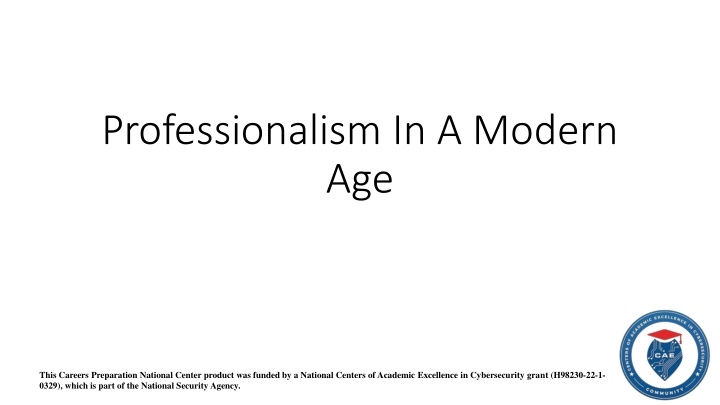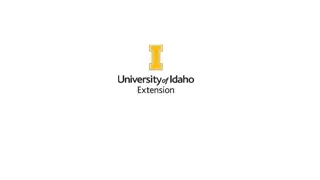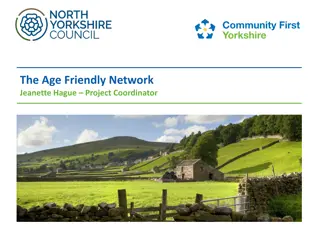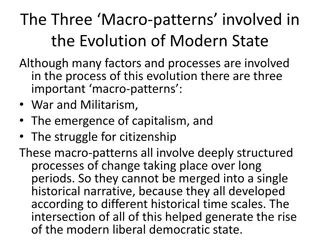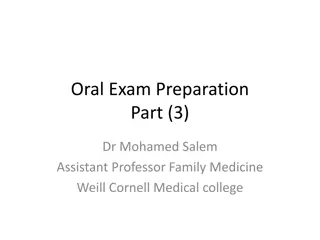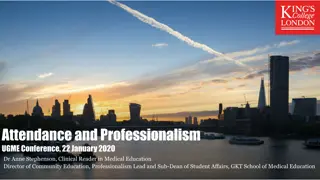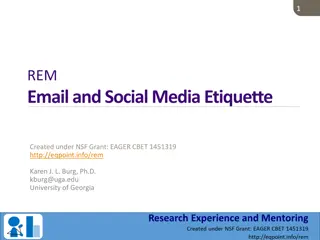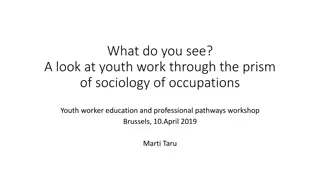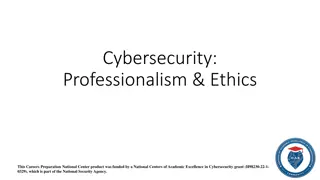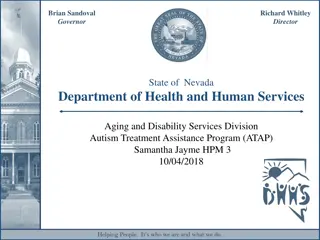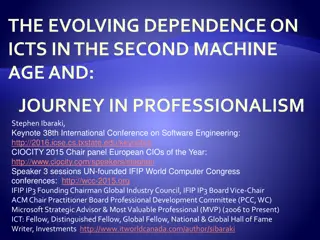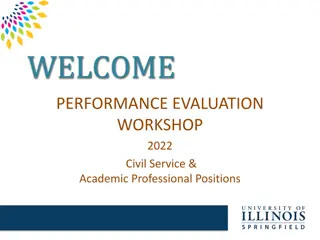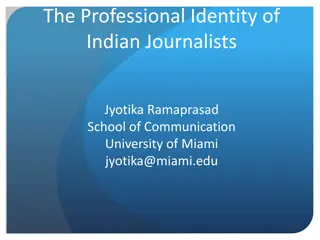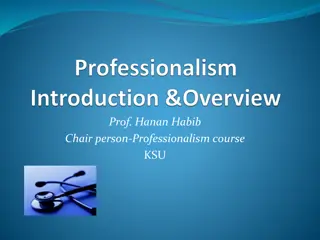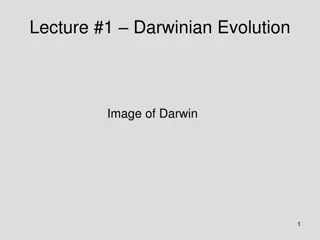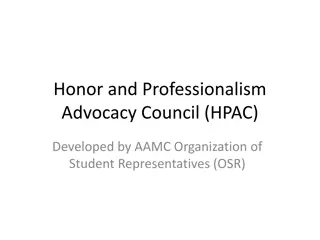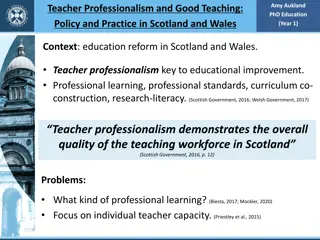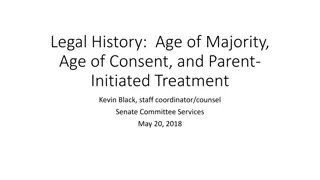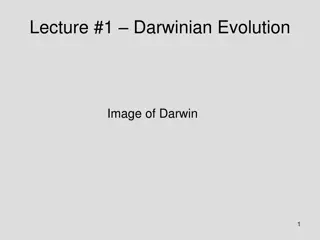Evolution of Professionalism in the Modern Age: A Comprehensive Workshop
Explore the evolution of professionalism through the ages and its relevance in today's digital world. Understand the essential skills and behaviors that define professionalism, and learn how to apply them in various aspects of your professional and personal life. Gain insights into conflict resolution, effective communication, and the benefits of maintaining professionalism in a modern context. Sharpen your skills and enhance your professional image in this engaging workshop.
Download Presentation

Please find below an Image/Link to download the presentation.
The content on the website is provided AS IS for your information and personal use only. It may not be sold, licensed, or shared on other websites without obtaining consent from the author.If you encounter any issues during the download, it is possible that the publisher has removed the file from their server.
You are allowed to download the files provided on this website for personal or commercial use, subject to the condition that they are used lawfully. All files are the property of their respective owners.
The content on the website is provided AS IS for your information and personal use only. It may not be sold, licensed, or shared on other websites without obtaining consent from the author.
E N D
Presentation Transcript
Professionalism In A Modern Age This Careers Preparation National Center product was funded by a National Centers of Academic Excellence in Cybersecurity grant (H98230-22-1- 0329), which is part of the National Security Agency.
Welcome! Thank you for joining us for this workshop! This workshop is focused on professionalism in the modern age! As well as looking at how professionalism has evolved and changed! We hope you find this workshop, fun, informative, and beneficial to your effort! Our Agenda: What is Professionalism? Professionalism Through the Ages Professionalism Today Professional Start Professional Building Communicating Professionalism Exemplifying Professionalism Conflict Resolution Benefits of Professionalism Professional: OFF Sharpening Your Skills
What is Professionalism? Professionalism may mean different things to different people based on a variety of factors. For our purposes, Professionalism is defined as: The competence or skill expected of a professional -Oxford Languages Why this definition? Competence and skills are not just technical We will discuss and look at how you already have professional skills and how to apply them
Professionalism Through The Ages Professionalism has not been a static thing, it has continually evolved So we must evolve as well In the past professionalism, was much more of a personable, one-on- one or one-to-group Meaning your professionalism was much more of a public display Technology and access to data has influenced this immensely In ways you must be aware of Technology is not only impacting the ways in which we work, but in our understanding of who we work with As well as who to hire
Professionalism Today Professionalism is involved in almost every aspect of our lives, whether you realize it or not. We have a social media platform for it...(LinkedIn) It is expected that we demonstrate professionalism or uphold certain standards even off-hours Yes, your employer can fire you for your personal postings (even on a private account should it be discovered) We should look at professionalism as a way to present ourselves both online and offline. So how can we start?
Professional Start You have already been building your professional skills Sports Clubs Volunteer work Community projects or relative projects The characteristics that you have built in these activities translates to the workplace: Self-Esteem Respect Communication Critical Thinking Can you think of others?
Professional Building We have a foundation from the previous slide Now how do we continue to build professional skills? Keep doing good things Keep trying new things Keep helping others Keep improving and identifying skills you need How do we identify? Job, internship, apprenticeship postings What others tell us What we know
Activity: Building Professionalism Go to these links: Workforce Framework for Cybersecurity (NICE Framework) | NICCS (cisa.gov) DoD Cyber Workforce Framework DoD Cyber Exchange Spend 10-15 minutes identifying 2 roles you may be interested in Read through the Abilities & Skills Identify 3-5 professional skills that you need to succeed in that role Don t copy the bullets, read through and think about what skill that exemplifies Finally, go here: Cyber Career Pathways Tool | NICCS (cisa.gov) Highlight 2 roles you chose, and write down the roles they connect to
Welcome Back! We hope you had a great lunch! Did you think about professionalism? Did you think of more skills you developed? Or did that job keep your attention? We are going to discuss and work on how to communicate professionalism It s one thing to have it, it s another thing to share it It s a necessary thing to share
Communicating Professionalism We ve identified professional skills needed for specific jobs Communicating your professionalism can be as simple as Resume But that s the bare minimum Communicating professionalism should be second-nature Professionalism more than just leadership It is about doing right by your fellow person, whether or not you ll receive all the credit Communicating is done non-verbally and verbally It s reducing conflicts Building loyalty & trust Communicating professionalism is done in your everyday actions in the workplace As well as your public image
Exemplifying Professionalism As mentioned previously, non-verbal communication is just as important as verbal communication. Exemplifying professionalism can be as simple as: Maintaining eye contact (in interviews and in everyday communication) Posture & body language Handshakes Facial expressions & gestures Reading the room Exemplifying professionalism is not just telling people what you are good it, it s about leading by example
Conflict Resolution Conflict is an inevitability that cannot be avoid in a workplace (and in life) Part of professionalism is being able to resolve conflict regardless of it being work related or not Competition is a type of conflict, be professional, ethical, compete with honor and integrity with grit and determination Resolutions: Accommodation Listening to the other party and coming to an agreement that addresses their issue. Compromising Listening to the other party and both agreeing to give up something to reach an acceptable solution (on both sides). Collaborative Working with the other party to create a win-win situation for all parties. Forgiveness Even if you re the one wronged, willing to work despite of the issue Remember a critical part of professionalism is developing and maintaining trust even in conflict.
Benefits of Professionalism Professionalism is not a tree that bears no fruit Here are some benefits of professionalism for both you and the organization: Healthy, fun & engaging workplace environment Better relationships between coworkers, managers, & supervisors Enjoyment in what one does Effective Communication Clear Career Pathways These are just a few, from what we ve discussed today, can you think of other benefits from professionalism?
Professionalism: OFF You are not a machine This workshop isn t to turn you into a machine either It is normal to want to turn professionalism off To have a moment to relax and not have to be on your best behavior This is a normal and okay feeling! It is also doable! Find ways to relax Find things that interest you outside of your work Have hobbies that are away from technology Enjoy meeting up with friends Professionalism OFF doesn t equal abandon everything Have fun, but have fun responsibility Always be careful about what you post!
Sharpening Your Skills If you recall, you identified several work roles that interests you and some professional skills that you would need to be in that role. Identifying the skills are the first step, now you need to develop/sharpen them Be active In your community In your field Participate in competitions, labs, and/or coursework https://d2hie3dpn9wvbb.cloudfront.net/ myEMates is a great resource to learn concepts and terms interactively as well as skills Map out your path Work towards that path Don t dismiss any learning opportunities along the way Diligence is a professional skill!
Activity: Professional Pathway Return to that document that you used to identify 2 work roles From the careers they connect to, pick 1 For the next 15-20 minutes compare the two, what differentiates them Finally, write out a 5 step plan on developing at least 1 skill that relates to both fields and how you can achieve it We will discuss it at the end
Conclusion Thank you for attending this workshop We hope you are leaving more confident and with an idea of how you can develop your professional skills As well as a pathway to do so Professionalism shouldn t stop here, in fact, it should be something that is continually worked. You re already doing it, so keep up the great work!
